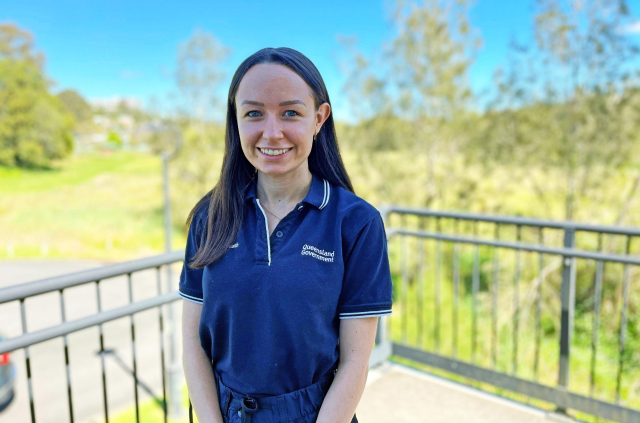
Last week we celebrated World Environmental Health Day, a day to raise awareness about environmental issues and the direct impact they have on human health.
Our environmental health workforce is on the frontline of protecting our community by monitoring and enforcing public health legislation, undertaking risk assessments, responding to disasters, investigating diseases, and so much more.
Our Public Health workers, including Environmental Health Officers (EHOs), are the quiet achievers of the health service. As EHO Chloe Hyland put it, “Public Health is often invisible when everything works well, because nobody gets sick”.
We had a chat to Chloe to find out more about the exciting and diverse role of an EHO.
How long have you been an Environmental Health Officer with the Public Health Unit?
4.5 years – I began my student placement in November 2019 and was employed in April 2020.
What led you on this career path?
Since primary school, I have answered every 'What do you want to be when you grow up?' question with 'something that helps people.' I knew I wanted a career in healthcare, and I loved science, but I never found a job that felt like the perfect fit. So, when it came to enrolling in university, I enrolled in a general Health Science degree and hoped I would work out what I wanted to do with it along the way.
When I say it didn't take me long to work out, I'm not exaggerating. On my second day of orientation, the head of environmental health at Griffith University presented to the health science cohort about all things environmental health, and I was sold. So that night, I enrolled in the environmental health major and graduated with a Bachelor of Health Science with a major in Environmental Health.
What does an ‘average’ day look like for an Environmental Health Officer?
The drawcard of the job is that almost every day looks different. Environmental health, at its core, deals with physical, chemical, and biological factors in the environment that affect human health. As an EHO working at the State Government level, I enforce six pieces of legislation to protect public health.
Some of the things we might do in the day could include:
- Setting and collecting mosquito traps to monitor for mosquito-borne diseases (e.g., JEV and dengue).
- Inspecting retail stores and seizing illicit tobacco and vapes.
- Taking water samples from a spa as part of a legionella investigation.
- Investigating foodborne illness outbreaks (e.g., salmonella, hepatitis E).
- Investigating a notifiable disease outbreak within a homeless shelter, childcare, or aged care centres and providing infection control advice.
- Working with major event organizers to ensure they comply with the public health legislation, (e.g., smoking and food labelling laws)
- Inspecting radiation sources at dentists, hospitals, laser clinics and vets
During a disaster (e.g., a cyclone), we also get to be heavily involved, doing our day-to-day work more concentratedly —ensuring food and water sources are safe, communicable disease transmission risk is reduced through proper sanitation and infection control, and medication is safely stored.
What’s the most exciting part of the job?
The most exciting part is the diversity! We get a mix of being out in the community and in the office, and we get to interact with a diverse range of people along the way.
My career began at the very start of the COVID-19 epidemic. I was on student placement doing beach sand surveys, and overnight, I went from mornings at the beach collecting sand samples to working with quarantine hotels, ensuring they had adequate infection control measures and screening travellers at the airport to confirm they hadn’t been in hotspots, to give an example.
Not only is my job diverse, but we also get to work with various other professionals, including epidemiologists, nurses, doctors, police officers, border force officers, and so many more!
What do you find most rewarding about the role?
As EHOs, we are on the frontline of public health; we get to be hands-on in driving public health initiatives and enacting change, and that's exciting. For example, the new vape laws that passed recently - we are the ones in the community removing them from stores, so they don't end up in the hands of vulnerable children.
Personally, I love the idea that I get to make a difference in people’s lives by preventing them from being exposed to things that could make them sick.
What is your advice to anyone looking to explore Environmental health as a career path?
Go for it - I genuinely look forward to coming to work every day, and I think that’s great.
There are various pathways to becoming an EHO; whether you want to study an undergraduate or postgraduate degree, you just have to complete an accredited course; a list can be found on the Environmental Health Australia website.



